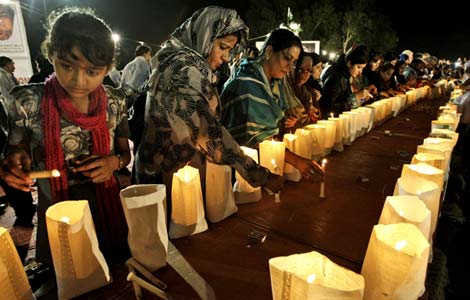Chengguan burdened by reputation
Updated: 2013-06-25 02:33
By AN BAIJIE (China Daily)
|
||||||||
 |
|
Zhang Jianchao, head of the Yan'an urban management bureau, apologizes to Liu Guofeng, a victim of violent law enforcement by chengguan, in a hospital in Yan'an, Shaanxi province, on June 7. LIANG AIPING / XINHUA |
Yao Aiting has only been an urban management officer — better known as chengguan — for a year, but she is already regretting her career choice.
The 25-year-old was hired in Dongying, a coastal city in Shandong province, after graduating from college in July.
At first, she was proud of her "government job" and stable income. Yet that novelty quickly wore off.
"Repeated reports in the media about chengguan clashing with street vendors and people who refuse to demolish illegal buildings have ruined our reputation," she said.
China's urban management system was set up in the 1990s to fill the gap in supervision at city level. The officers' duties include clearing unlicensed street vendors and other obstructions from sidewalks and removing buildings constructed without permission.
However, the authority is frequently criticized for reports and video footage that show the excessive and sometimes brutal force they employ to carry out those duties.
An incident on May 31 saw seven chengguan fight with three bicycle store salesmen in Yan'an, Shaanxi province.
Footage uploaded to video-sharing site Youku.com that went viral online showed officers confiscating bikes, which they say were blocking the sidewalk, before a brawl broke out. At one point, a large, uniformed chengguan officer stamped on the head of a salesman on the ground.
The video triggered a public outcry, and on June 4 the Yan'an city government responded by suspending four officials and four employees involved in the conflict.
Authorities said the uniformed man who stamped on the salesman was a "temporary employee", yet they were immediately accused of attempting to divert the blame.
"There are no temporary workers after the Labor Contract Law was enacted," Meng Fei, a TV celebrity, wrote on Sina Weibo, China's Twitter-like service. "If contracts are signed, they should be formal workers, and if there is no contract, the employment is illegal."
The post has so far been forwarded more than 200,000 times.
Yao in Dongying said she is a temporary worker, explaining that she is signed up with an employment agency, which in turn has a contract with the city's chengguan bureau.
"We are not civil servants," she said, adding that there are about 50 temporary workers in her bureau, compared with 40 to 50 full-time staff members.
An investigation by the Beijing Committee of the Chinese People's Political Consultative Conference, the nation's top advisory body, found that the capital's urban management office had 7,000 civil servants and 6,500 temporary workers in 2011.
Temporary workers sign one-year renewable contracts, Yao said, but civil servants only need to sign one at the start of their career. Another difference, she added, is that she is paid only 2,000 yuan ($325) a month, half the salary of her civil servant colleagues.
"From the government's perspective, hiring temporary workers saves costs and minimizes the risk of being involved in conflicts, as all the blame can be pushed onto them," Yao said.
Most Viewed
Editor's Picks

|

|

|

|

|

|
Today's Top News
Berlusconi convicted on sex charges
US presses Russia over Snowden case
Xi: 'Exploration part of Chinese dream'
Chinese, Brazilian presidents discuss ties
China rejects Philippines' illegal seizure of reef
Immigration bill passes Senate vote
Liquidity squeeze bleeds equities
Surviving mountaineer in embassy
US Weekly

|

|














